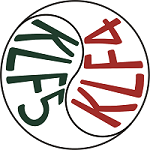
Introduction
The mammalian intestinal epithelium is a dynamic system in which proliferation, migration, differentiation, and apoptosis are carefully orchestrated throughout the lifespan of an organism. Proliferation of multipotent stem cells and progenitor (also called transient amplifying) cells is confined to the crypt epithelium of the intestine. Characterization of the molecular network that that regulates intestinal epithelium homeostasis and pathogenesis underlying certain disease processes such as inflammatory bowel disease and neoplasm of the intestinal tract is main focus of research in our laboratory.
Krüppel-like factor 4 [KLF4] and Krüppel-like factor 5 [KLF5] zinc finger transcription factors are enriched in the intestinal epithelium but their expression is spatially distinct. KLF4 is primarily expressed in the post-mitotic, differentiated epithelial cells of the small intestine and colon and KLF5 is expressed in the crypt epithelium. Expression of KLF4 and KLF5 also corresponds to the proliferative states of cells expressing each - KLF4 is primarily expressed in non-proliferative cells and KLF5 in proliferating cells. Our studies highlight the important roles of KLF4 and KLF5 in modulating both normal physiology and pathobiology of the intestine.
Project 1: KLF4 and Colorectal Cancer
The goal of this project is to understand the molecular mechanisms responsible for the formation of colorectal cancer [CRC]. We have established that KLF4 is anti-proliferative and is essential for mediating the cell cycle checkpoint functions of p53 following DNA damage. KLF4 has been shown to be a potential tumor suppressor in CRC in both humans and in mouse models of intestinal tumorigenesis, and its genetic deletion results in centrosome amplification. Additionally, KLF4 was shown to be a suppressor of epithelial-to-mesenchymal transition [EMT] in breast cancer cells. The focus of these studies is to understand the role of KLF4 in regulating genomic stability and centrosome duplication and its involvement in suppression of EMT in CRC.
Project 2: Targeted Therapy and Colorectal Cancer
Krüppel-like factor 5 [KLF5] as an important regulator of intestinal epithelial cell proliferation that is frequently overexpressed during intestinal tumorigenesis. We have linked KLF5 to both the RAS and Wnt signaling pathways in colorectal carcinogenesis. Our group has also observed that reduction in KLF5 expression leads to reduced intestinal tumor formation in mice harboring a germline mutation in the tumor suppressor gene, APC, a crucial component of the Wnt pathway, or combined APC and KRAS mutations. We use an ultrahigh-throughput screening (uHTS) approach to identify novel lead compounds with potential therapeutic benefits by targeting KLF5 expression. The goal of this project is to develop and characterize novel therapeutic agents for the prevention and/or treatment of colorectal cancer.
Project 3: KLF4 and KLF5 and Intestinal stem cells
The mammalian intestinal epithelium is a continuously renewing and highly regenerative tissue in which numerous biological processes are carefully choreographed to achieve homeostasis. The renewal process is initiated at the bottom of the crypt which contains the intestinal stem cells (ISCs). The ISCs have been classified as: 1) actively dividing crypt basal columnar cells (CBCs) that are marked by factors such as LGR5 and, 2) quiescent stem cells present at the +4 position marked by factors such as BMI1. Under normal conditions, LGR5+ stem cell population is the main source of replenishment of the intestinal epithelium. However, following acute radiation injury, LGR5+ stem cell population perishes and regeneration of the epithelium is carried out by BMI1+ stem cells by giving rise to new population of LGR5+ cells and subsequent progenies. The focus of this project is to understand the function of KLF4 and KLF5 as mediators of the proliferative and regenerative response of the intestinal epithelium following injury.
Project 4: KLF5 and Epithelial barrier integrity
Impaired integrity of the intestinal epithelial barrier is a key feature of inflammatory bowel disease (IBD). The protective lining of the mucosa is disrupted during flares of inflammation, resulting in increased exposure to noxious agents and luminal antigens that aggravate and prolong the inflammatory condition. Thus, restoring the epithelial barrier is a critical step in limiting mucosal inflammation and promoting healing in these patients. Our research is focused on Krüppel-like factor 5 (KLF5), which we have shown to be important for intestinal epithelial homeostasis, integrity, and injury repair. The studies are focus on understating of the role of KLF5 in epithelial regeneration and barrier integrity and its role in the epithelial healing in mouse models of colitis.